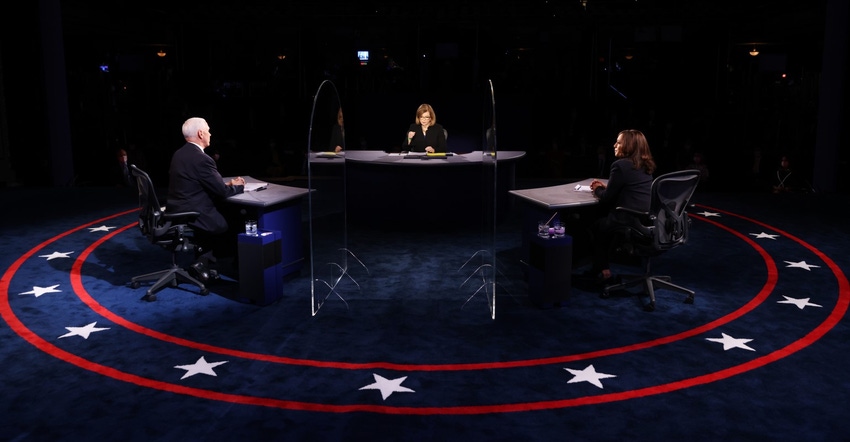Ag issues arise in vice presidential debate
Trade and climate change viewpoints differentiate 2020 presidential campaigns.

It isn’t often that the word "farming" or "agriculture" comes up in debates, and it didn’t in the first presidential debate held Sept. 30. However, in the vice presidential debate held Oct. 7, issues such as the impact of trade and climate change on farmers and support for renewable energy surfaced in responses.
In questions about China, moderator Susan Page of USA Today said there is no more complicated or consequential foreign relationship than the one with China. “It is a huge market for American agricultural goods. It’s a potential partner in dealing with climate change in North Korea, and in a video tonight, President [Donald] Trump again blamed it for the coronavirus, saying China will pay,” Page said in asking Vice President Mike Pence and Democrat vice presidential nominee Sen. Kamala Harris (D., Cal.) about the relationship with China and whether they considered China an adversary or enemy.
Pence responded that Trump, "in dealing with China from the outset of this Administration," has stood up to China, which had been "taking advantage of America for decades in the wake of Joe Biden’s cheerleading for China. … We want to improve the relationship, but we’re going to level the playing field, and we’re going to hold China accountable for what they did to America with the coronavirus.”
Harris responded, in part, “We mentioned before, the trade deal, the 'trade war,' they wanted to call it, with China. It resulted in the loss of over 300,000 manufacturing jobs and a manufacturing recession, and the American consumer paid thousands of dollars, more for goods because of that failed war that they called it.”
Harris added that Trump has tainted the relationships with China as well as other world leaders.
“Foreign policy, it might sound complicated, but really it’s relationships. Just think about it as relationships. So, we know this in our personal and professional relationships, you got to keep your word to your friends, got to be loyal to your friends. People who’ve stood with you, you got to stand with them. You got to know who your adversaries are and keep them in check. But what we have seen with Donald Trump is that he has betrayed our friends and embraced dictators around the world,” Harris said.
Pence also pointed to Harris’s voting record on trade and said she was one of only 10 senators who did not vote for the U.S.-Mexico-Canada Agreement. Pence said the North American trade pact “was a huge win for American farmers, especially dairy in the upper Midwest, but senator, you said it didn’t go far enough on climate change. You put your radical environmental agenda ahead of American auto workers and ahead of American jobs.”
Climate change
Farmers also got name dropped on the topic of the changing climate. Specifically, Harris said Democrat presidential nominee Joe Biden "has seen and talked with the farmers in Iowa whose entire crops have been destroyed because of floods.” She also mentioned the wildfires in her home state of California and the hurricanes in the Southeast.
Harris added, “So, let’s talk about who is prepared to lead our country over the course of the next four years on what is an existential threat to us as human beings. Joe is about saying we’re going to invest that in renewable energy, which is going to be about the creation of millions of jobs. We will achieve net zero emissions by 2050, carbon neutral by 2035. Joe has a plan. This has been a lot of talk from the Trump Administration, and really it has been to go backward instead of forward. We will also re-enter the [Paris] Climate Agreement with pride.”
Pence responded to a follow-up question on whether or not climate change is an existential threat by saying the “climate is changing” and “we’ll follow the science.”
However, Pence warned that government mandates or participation in the Paris Climate Accord isn’t needed. “We’ve made great progress reducing [carbon dioxide] emissions through American innovation and the development of natural gas through fracking. We don’t need a massive, $2 trillion Green New Deal that would impose all new mandates on American businesses and American families,” Pence stated.
About the Author(s)
You May Also Like




.png?width=300&auto=webp&quality=80&disable=upscale)
